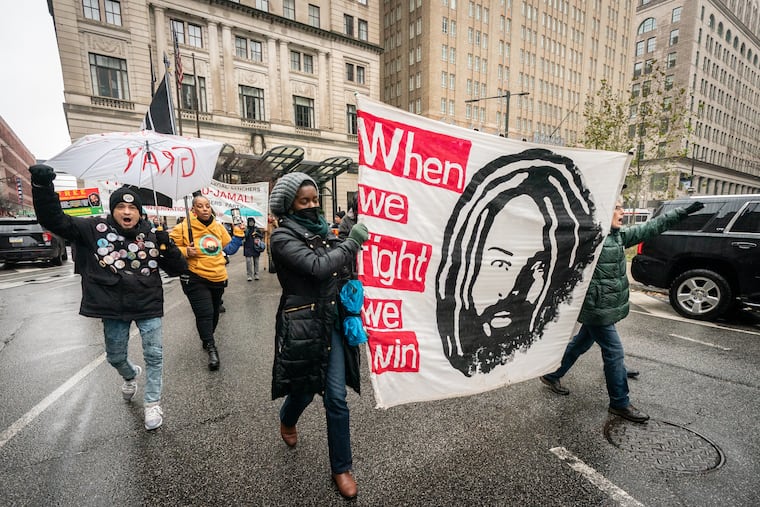Mumia Abu-Jamal, convicted of killing a police officer, pursues one more appeal. He is facing a skeptical judge.
Abu-Jamal has brought numerous appeals over the decades. The judge in his current appeal appears impatient with that.

Forty-one years and one week after Philadelphia Police Officer Daniel Faulkner was shot to death, the latest defense team for his convicted killer, Mumia Abu-Jamal, sought Friday to persuade a skeptical judge to overturn his life sentence.
Abu-Jamal, 68, has filed eight appeals since his conviction on charges of killing Faulkner, who was 25 when he died on Dec. 9, 1981. His one victory came in 2001, when a federal judge overturned Abu-Jamal’s death sentence, but upheld his conviction.
In the latest appeal, his lawyers drew upon material they found in six file boxes related to Abu-Jamal’s case that city prosecutors turned over to the defense in 2019, saying staff had inadvertently found them while searching for office furniture.
Abul-Jamal’s lawyers say the material suggests that prosecutors paid one key witness to testify against him during his 1982 trial, improperly promised leniency to another witness in her pending prostitution cases, and improperly barred Black jurors from hearing the case.
Prosecutors say the defense has imposed a falsely sinister reading of benign material. And Common Pleas Court Judge Lucretia Clemons strongly signaled in a 30-page opinion last fall that she is leaning toward dismissing the defense appeal.
However, she gave the two sides one last chance Friday to argue their positions. The lawyers did so in a courtroom filled with about 50 Abu-Jamal allies, as well as Faulkner’s widow, Maureen, and a smaller number of her supporters. Abu-Jamal, imprisoned in a state facility near Hazleton, was not there.
Clemons said she would rule within three months. Before ending the hearing, the judge asked the prosecutors and defense lawyers to make sure that Abu-Jamal’s lawyers had reviewed every scrap of evidence that the District Attorney’s Office could share.
“I do not want to do this again,” she said.
After his conviction and especially during his years on death row, Abu-Jamal became an international cause cèlébre. In August, Brown University announced that it had bought his private papers for an undisclosed amount.
At the time of the murder, Abu-Jamal was driving a taxi after losing his job as a journalist with public radio in Philadelphia after he became fascinated by the counterculture group MOVE. He encountered Faulkner at 4 a.m. after noticing that the officer had pulled over his younger brother in a car stop at 13th and Locust Streets.
Prosecutors said he shot Faulkner in the back and then stood over him and shot him in the face. Faulkner, in turn, shot Abu-Jamal in the chest, and he was found, wounded, next to Faulkner’s body.
In the appeal, defense lawyer Judith Ritter, a professor at Widener University-Delaware Law School, said the new material showed that eyewitness Robert Chobert wrote to the original prosecutors several weeks after the trial asking, with uncertain spelling, “I have been calling you to find out about the money own to me.”
She said this was evidence Chobert was to be paid for his testimony. But Assistant District Attorney Grady Gervino told the court the letter was not evidence of any such deal. The original prosecutor, Joseph McGill, has said in a sworn statement that Chobert was merely asking about money for lost wages for the days he was on the stand.
Abu-Jamal’s lawyer also cited a newly discovered 1982 memo from the District Attorney’s Office about another witness in the case, Cynthia White, who has since died. In it, a supervisor wrote that White should be “vigorously prosecuted” in pending prostitution cases, but also that the assigned assistant district attorney should talk with McGill first.
Ritter said this suggested White expected to be given a break in her cases in return for helping convict Abu-Jamal. Gervino rejected this interpretation and noted that both McGill and White have said they had no deal.
Finally, the defense questioned whether McGill had improperly barred Black candidates from the jury, which was made up of 10 white members and two Black members. They noted that the new files showed that McGill had noted the race and gender of some of the potential jurors.
Gervino said McGill had been keeping track of race in case the defense sought to bring a future legal challenge to the jury on racial grounds.